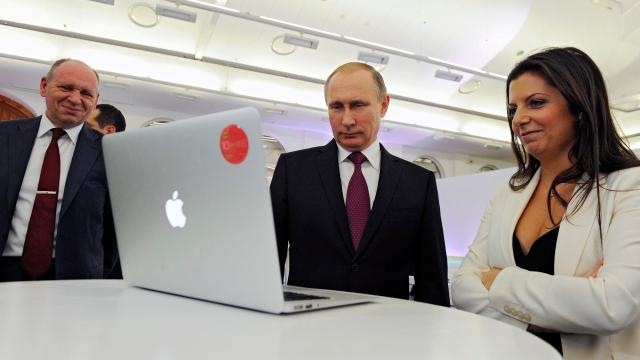The Moscow Times has a fascinating look at the Russian media outlet RT, formerly known as Russia Today. The Kremlin-funded operation is highly secretive, thanks to non-disclosure agreements that employees are forced to sign, but the Moscow Times was able to get a peek at how the RT sausage gets made.
Vladimir Putin and Editor-in-chief of RT (Russia Today) Margarita Simonyan attend an exhibition marking RT’s 10th anniversary in Moscow, on 10 December 2015. (Mikhail Klimentyev/Sputnik, Kremlin Pool Photo via AP)
RT has come under fire from Western democracies around the globe, including, most recently, from newly elected French president Emmanuel Macron. At a recent press conference with Vladimir Putin, Macron bluntly said, “Russia Today and Sputnik were agents of influence and propaganda that spread falsehoods about me and my campaign.”
Western countries that might best be described as aspiring democracies are also highly critical of RT. The United States, for example, has railed against RT’s tactics during the 2016 presidential election. But despite RT’s spread of propaganda in the US, American intelligence agencies haven’t exactly made a compelling case that RT swung the election any more than the news outlet that actually got Trump elected: Fox News.
Nonetheless, the Moscow Times offers a fascinating look at the Russian propaganda machine. Some tidbits from the article:
‘Who poses the greatest nuclear threat?’
The renaming [from Russia Today to RT] broadly coincided with a shift in focus — from promoting Russian news narratives to undermining Western ones. No expense was spared in positioning the channel as an alternative to mainstream media. In 2009, an advertising campaign created by international PR firm McCann Erickson contrasted former U.S. President Barack Obama and then-Iranian President Mahmoud Ahmadinejad with the question: “Who poses the greatest nuclear threat?”
Fear and paranoia
Problems within RT have remained unreported largely because employees are nervous about talking with journalists. The Moscow Times approached a large number of current and former staff members. Most of them declined to comment in any capacity, citing non-disclosure agreements. Almost all of them described a sense of fear and paranoia when it comes to discussing RT outside of work.
Just looking for a job
According to TMT sources, most of the Russian staff are apathetic or apolitical, with no prior experience in journalism. Often they are linguists by training, or the “children of Russian diplomats” with fluent English. Besides leftist Westerners, who view RT as a platform to push anti-establishment views, RT has also recruited long-time apolitical expats “looking to leave English-teaching jobs.” There are also, of course, some foreigners who could be described as “true believers” in RT’s pro-Russia mission.
Shooting itself in the foot
“Our attempt to change RT, to make it more professional and objective, would likely have just made it a more effective propaganda medium,” the source said. “I am glad that a combination of apathy, a lack of professionalism and a dearth of real talent keep RT from being more effective than it currently is.”
The entire article, written by Matthew Bodner, Matthew Kupfer and Bradley Jardine, is fascinating.
